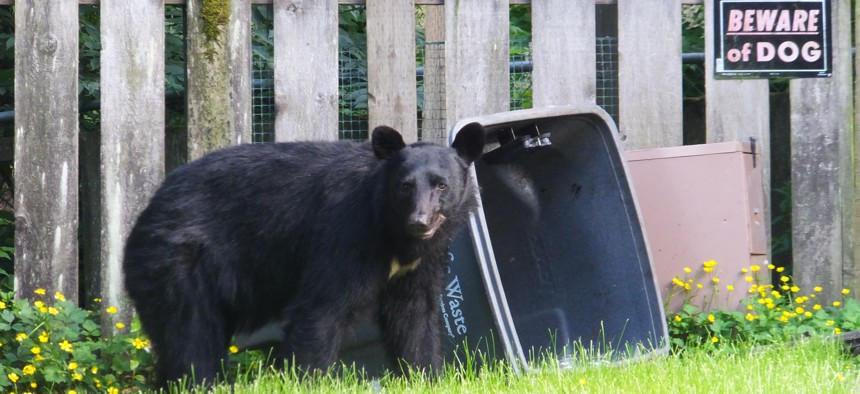How Some Alaska Cities Try to Outsmart Bears

A bear looks up from rifling through the garbage in the front yard of a home in Juneau, Alaska, on Sunday, July 6, 2014. Becky Bohrer / AP File Photo
In Juneau, garbage management has to take hungry animals into account.
This is the second in a series of Route Fifty dispatches from Alaska.
JUNEAU, Alaska — Coexisting with bears in urban environments is a challenge that’s not unique to the 49th State. From the foothills of the Denver area—where sheriff’s deputies were called to free a bear that somehow locked itself inside a car last year—to the grounds of an apartment building in Washington, D.C. , these animals can be a big headache for local government officials.
Bears are fortunately not too much of a public safety hazard—attacks on humans are extremely rare—but the risk is still very real. Most of all, bears can be a nuisance for local police and state wildlife managers, who have to figure out ways to deter the animals, relocate them or in some cases, kill them.
The common thread for bear incidents in urban settings usually involves food waste in unsecured garbage bins. And that’s something Alaskans know very well.
A tipped-over garbage can is a sure sign that a bear was rummaging for food.
“If they continue to get rewards here, then they have no reason to go den,” Stephanie Sell, an Alaska Department of Fish and Game biologist, told the Juneau Empire last October regarding a pile of household garbage items, including three refrigerators, left behind a hotel and near a staircase that bears are known to use to venture into Juneau’s downtown commercial core.
Last year in Anchorage’s Government Hill neighborhood, only 10 percent of 374 eligible homeowners took advantage of a pilot program where they could upgrade to bear-resistant trash cans for free, Alaska Dispatch News reported in November. Not surprisingly, the neighborhood has experienced nuisance incidents involving bears breaking into garbage bins to feast.
Here in Alaska’s capital city, where bears can easily wander down into town from the mountains in search of food, local garbage rules and practices are more strict.
In parks and on streets, public garbage cans have a special bear-proof locking mechanism that humans need to release before lifting the lid. That includes a trash bin across the street from the State Capitol, a place where you wouldn’t necessarily think as a vulnerable spot for a bear in search of food.

The City and Borough of Juneau has fairly specific rules when it comes to residential trash cans :
- Garbage cans may be put out to the curb for collection no sooner than 4 a.m. on pickup day.
- Other than after 4 a.m. on pickup day, garbage must be kept in a bear resistant container or enclosure.
- in a strong fully enclosed structure such as a garage
- in another "bear resistant enclosure," defined as an enclosure that you can't get into unless you use hands or tools. If it can be opened by stomping on it, kicking it, running into it with your body, or other similar action, it is not bear resistant.
- Garbage cans must be fitted with lids so as to remain secure if cans are tipped over.
- If your garbage has attracted bears and you fail to take steps to legally store your garbage, you could be cited for maintaining a bear attraction nuisance, a $50 fine for the first offense.
Larger garbage storage units, like Dumpsters have similar rules regarding “putrescible waste,” which includes food and nasty stuff like used diapers.
Last week, members of the City and Borough of Sitka’s local assembly passed an ordinance on first reading that would toughen garbage rules. The ordinance heads to a public hearing and second reading next week.
“We have not a problem bear issue as much as problem people and the way they handle their trash,” Steve Bethune, an Alaska Department of Fish and Game wildlife management biologist, said, according to the Daily Sitka Sentinel .
Michael Grass is Executive Editor of Government Executive’s Route Fifty and is based in Seattle.
NEXT STORY: LIVESTREAM - Pioneering Facilities Management In Tennessee






